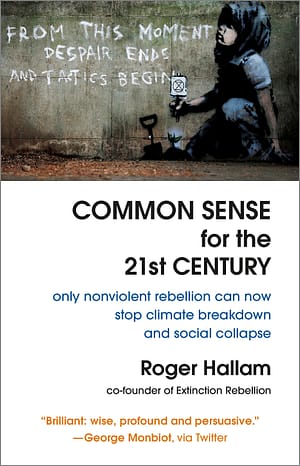Mass Rebellion: When Common Sense Turns Into Rebellion

“Is Common Sense for the 21st Century the best hope we’ve got to prevent human extinction? Yes, I think it is.”— Dr. Alexandra Jellicoe
Roger Hallam—leading environmental activist and co-founder of Extinction Rebellion—believes real change comes from ordinary people breaking the law. When he was jailed in September for flying a drone at Heathrow in protest of what he calls a “carbon-intensive monstrosity”, Hallam continued his activism from his cell, signing on with Chelsea Green to publish his climate emergency manifesto and activist guide from behind bars in early October, just days before an international XR protest involving 60 cities worldwide that showed the world how mass disruption, mass arrests, and mass sacrifice can disrupt business as usual. With global ecological collapse and the future of human existence at stake, we can’t waste a moment.
From Publishers Weekly
“The acquisition of Common Sense took place as different groups were planning strikes to highlight the dangers posed to the climate. [Margo] Baldwin first began discussion with Hallam in late August after learning of his intention to self-publish the book. But the activist was arrested on September 14 after flying a drone over Heathrow Airport to protest airline carbon emissions. The two forged ahead, and Hallam inked the deal from London’s Wormwood Scrubbs Prison on October 7.”
The following is an excerpt from Common Sense for the 21st Century by Roger Hallam. It has been adapted for the web.
It is time to grow up and see the world as it is.
There are some things which are undeniably real, there are some things we cannot change, and one of those is the laws of physics. Ice melts when the temperature rises. Crops die in a drought. Trees burn in forest fires. Because these things are real, we can also be certain about what the future holds. We are now heading into a period of extreme ecological collapse.
Whether or not this leads to the extinction of the human species largely depends upon whether revolutionary changes happen within our societies in the next decade. This is not a matter of ideology, but of simple maths and physics.

In short, we are fucked – the only question is by how much and how soon? Do we accept this fate? I suggest we do not. Many self-respecting people who can overcome the human failing to disbelieve what they don’t like, now accept what is obvious looking at the natural science. But they have yet to work through the political and social implications. This booklet sets out what is now obvious from a social scientific point of view: societies will not change with the necessary speed without rebellions and a revolutionary transformation of our societies and politics.
This is not a matter of one’s political party preferences. It is a matter of basic structural sociology. Institutions, like animal species, have limits to how fast they can change. To get rapid change they have to be replaced with new social systems of policy, practice and culture. It is a terrible and painful realisation, but it is time to accept our reality. Just because we don’t like something does not mean it is not true.
All of this is common sense.
In 1776, Thomas Paine wrote a pamphlet titled Common Sense to tell the American population what they privately knew but did not have the courage to declare openly: that they needed to declare independence from the British Crown. It was read by 10% of the population and is credited with transforming the resolve of many Americans to strike out into the political unknown.
Likewise, my proposition in this booklet is a Common Sense for the 21st century. I declare what we already know: things cannot carry on as they are. Only a revolution of society and the state – a similar turn that Paine urged the Americans to take into the political unknown – can save us now.
This is the first step in transformation: accepting the truth as it is. Climate and ecological breakdown will kill us all in the near term unless we act as if the truth is real.
In this booklet, I explain the social implications – that the reformist political culture of both left and right in neoliberal society is now not fit for purpose. To put it bluntly, NGOs, political parties and movements which have brought us through the last 30 years of abject failure – a 60% rise in global CO2 emissions since 1990 – are now the biggest block to transformation.
They offer gradualist solutions which they claim will work. It is time to admit that this is a lie. They are diverting popular opinion and the public’s attention and energy away from the task at hand: radical collective action against the political regime which is planning our collective suicide.
The paradigm shift is to move from the words to radical action, from lobbying to mass breaking of the law through nonviolent civil disobedience and from elitist exclusion to popular democratic mobilisation.
The proposal 
We must adopt the most successful model for regime change shown by the social scientific research: the civil resistance model. This involves mass participation civil disobedience – tens to hundreds of thousands of people blocking the centres of cities to demand change.
There are many tactical options, but the main process is as follows:
- The people conduct mass mobilisation. Thousands need to take part.
- They amass in a capital city where the elites in business, government and the media are located.
- They break the law. They take that irrevocable step. Examples include blocking the roads and transport systems.
- They maintain a strictly nonviolent discipline even, and especially, under conditions of state repression.
- They focus on the government, not intermediate targets. Government is the institution that makes the rules of society and has the monopoly of coercion to enforce them.
- They continue their action day after day. One-day actions, however big, rarely impose the necessary economic cost to bring the authorities to the table.
- The actions can have a fun atmosphere. Most people respond to what is cultural and celebratory rather than political and solemn. Such an atmosphere also reduces tension, and keeps people calm and positive.
After one or two weeks following this plan, historical records show that a regime is highly likely to collapse or be forced to enact major structural change. This is due to well-established dynamics of nonviolent political struggle.
The authorities are presented with an impossible dilemma. On the one hand, they can allow the daily occupation of city streets to continue. This will only encourage greater participation and undermine their authority. On the other hand, if they opt to repress the protestors, they risk a backfiring effect. This is where more people come onto the street in response to the sacrifices of those the authorities have taken off the street. In situations of intense political drama, people forget their fear and decide to stand by those who are sacrificing themselves for the common good.
The only way out is for negotiations to happen. Only then will a structural opportunity open up for the emergency transformation of the economy that we need. Of course, this proposal is not certain to work but is definitely possible. What is certain, however, is that reformist campaigning and lobbying will totally fail as it has for decades. The structural change we now objectively need has to happen too fast for any conventional strategy.
I propose that a material analysis of power is necessary but insufficient to maximise the chances of revolutionary success. Social relations are built upon cultural rules as much as material interests. It is therefore important to attend to the symbolic and interpersonal as much as the material. Mass action cannot just be nonviolent in a physical sense but must also involve active respect towards the public and the opposition, regardless of their repressive responses.
This not only undermines the regime’s ability to ‘other’ you but also makes it much easier for it to save face when it comes to negotiations. Successful mass actions, then, have to include three aspects to optimise the chances of success: mass disruption, mass sacrifice, and respectfulness.
The mobilisation has to be built by creating alliances between networks. Most political networks are controlled by gatekeeper elites which have little or no interest in moving from a reformist to a revolutionary paradigm (even if they claim to believe in such a view). Nor will they wish to combine in a mass mobilisation in which they cannot control their particular ethical rules or identity orientations.

This then leads on to the thorny topic of framing, or the way in which we communicate the message. Only when the message is put into a culturally neutral language can a mass movement be built. Some groups which have a high level of self-identity will find working with others problematic so it will be necessary to create separate mobilisations which will combine together into a ‘movement of movements’ rebellion. However, most ordinary people will be attracted to getting involved to the extent to which they are personally welcomed into the movement. This requires close attention to the design of all meetings. These methods and attention to detail may seem inconsequential, but they are of vital importance in order to create an effective inclusivity.
Finally, there needs to be a post-revolutionary plan otherwise chaos will ensue. The plan I outline is for a national Citizens’ Assembly to take over the sovereign role from a corrupted parliamentary system. Parliament would remain, but in an advisory role to this assembly of ordinary people, randomly selected from all around the country who will deliberate on the central question of our contemporary national life: how do we avoid extinction?
They will decide what new structures and policies are necessary to maximise the chances of achieving our collective desire to live, now that the odds are stacked against us.
We need to start acting now.
We may need to act before governments come around. A transition movement has already started. This needs to be massively expanded and integrated with the Rebellion.
As this booklet goes to press, conflicting news comes that $1.9 trillion is being invested in gas and coal, whilst electricity generated from solar panels and wind turbines are almost on the verge of being cheaper than fossil fuels globally, and already are in many countries.
There’s no time to lose. Let’s get to it. It’s going to be quite a show.
About Roger Hallam
In April 2018, Roger Hallam met with a group of 15 activists, environmentalists, and scientists in a café in Bristol. Along with Gail Bradbrook and Simon Bramwell, he and others founded Extinction Rebellion. A former organic farmer and long-time climate change activist, Hallam has been on successful hunger strikes, been arrested 10 times and has served a prison term, all in the service of preventing a climate catastrophe.
Recommended Reads
All In the Question: What If We Started Asking Better Questions?
Recent Articles
Why is modern wheat making us sick? That’s the question posed by author Eli Rogosa in Restoring Heritage Grains. Wheat is the most widely grown crop on our planet, yet industrial breeders have transformed this ancient staff of life into a commodity of yield and profit—witness the increase in gluten intolerance and ‘wheat belly’. Modern…
Read MoreAddressing the pressing issues affecting everyday Americans is essential—and one of our nation’s most profound challenges is the devastating impact of mass layoffs. Layoffs upend people’s lives, cause enormous stress, and lead to debilitating personal debt. The societal harm caused by mass layoffs has been known for decades. Yet, we do little to stop them.…
Read MoreWhat does facing the beast mean? In this time of uncertainty, we must practice regular reflection to achieve optimal happiness and health. The metaphor below gives insight into confronting and facing it, regardless of what “the beast” is to you. The following is. an excerpt from Facing the Beast by Naomi Wolf. It has been adapted for the…
Read MoreWe’ve all heard of the phrases “time flies” and “time heals all wounds,” but what really is time, and how does it impact our lives? The concept of time may be even more powerful than we think, especially when it comes to the money we save and spend. The following is an excerpt from The…
Read More“Climate change asks us questions that climate science cannot answer,” — Dougald Hine When it comes to climate change, it seems as if there are always new questions arising: How did we get to this point? How can we stop it? What’s next? Unfortunately, there is no black-and-white, straightforward answer to any of them —…
Read More









